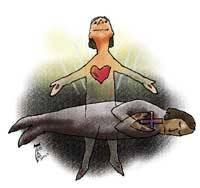Eternal Life,Christian Style
This year the Commemora-tion of All the Faithful Departed (traditionally known as All Souls Day) interrupts the cycle of Sundays in Ordinary Time. The choice of Scripture readings is quite extensive and even confusing, as a glance at the Lectionary Nos. 668 and 1011-15 will show. I have chosen texts that are among those most often selected in liturgies for this day.
Our secular culture has a hard time confronting the reality of death. Many of us try not to think about death, use euphemisms in talking about it and seek every natural and unnatural means to avoid it or put it off. For some, physical death is the absolute end of life. Therefore we should either “eat, drink and be merry” (hedonism) or use all our resources and efforts to make this world into a better place, because it is the only world we have (exclusive humanism). In certain late Old Testament books and in the New Testament, however, a different perspective on life and death emerges. While recognizing the natural character of physical death, these texts hold out hope for an eternal life with God and the avoidance of what can be called “ultimate death.”
Today’s Old Testament reading from the book of Wisdom (sometimes called the Wisdom of Solomon) is often used as the Old Testament reading at Catholic funerals. It comes from a Jewish book written in Greek in Alexandria in the first century B.C. The author was trying to bring together the best insights of the biblical and Greek philosophical traditions. While recognizing the reality of physical death, he offers the hope that wise and righteous persons may nevertheless enjoy eternal happiness with God and the blessed faithful. Even though skeptics (there were many in the writer’s time) regarded physical death as the absolute end of life, this biblical writer insists that the wise and righteous may and should hope for immortality, so they can regard the sufferings of the present and even their physical death as moments along the way to their future fullness of eternal life with God.
While the New Testament writers shared this belief in life after physical death, they based it not on the ancient Hebrew concept of Sheol as the abode of the dead (as the early Old Testament writers did), nor on the Greek philosophical idea of the immortality of the soul nor on the Jewish (especially Pharisaic) concept of the general resurrection of the dead. Rather, they based their hope for eternal life first and foremost on the resurrection of Jesus Christ as “the firstborn from the dead” (Col 1:18).
In today’s selection from John 6, Jesus proclaims that it is his Father’s will that “everyone who sees the Son and believes in him may have eternal life, and I shall raise him on the last day.” This statement implies that for those who believe in Jesus, eternal life has already begun. It does not begin at the moment of physical death. Instead, it begins in the act of faith in Jesus as the revealer and revelation of God. He becomes the point of “crisis” or decision for all. And Jesus promises that on the last day, at the general resurrection, those who believe in him will be raised, vindicated and richly rewarded. Thus John combines present and future eschatology. The pivot in all this is the resurrection of Jesus as the preview and guarantee of our future resurrection. In him and through him we have already begun to experience eternal life, and we can expect it to be even better.
In today’s selection from Romans 6 (the earliest theological reflection on Christian baptism), Paul focuses on the link between Christ’s death and resurrection and our baptism. Through baptism we have entered into both the death of Jesus and the eternal life of the risen Christ. Baptism involves dying with Christ in order to live with Christ. The water of baptism at once symbolizes death (by drowning) and life (without water life is impossible for humans). Baptism involves receiving the Holy Spirit, which is the power of God to live a virtuous and fruitful life in the present and to enjoy eternal life in the age to come.
What John and Paul hoped for was eternal life with Christ. The hope for eternal life is a desire planted deep in the human psyche. Yet we need some good reason on which to base our hope. John, Paul and other early Christians were convinced that they had found a good reason in the life, death and resurrection of Jesus. If resurrection and eternal life can happen in the case of Jesus, they can happen in our case too, provided that we remain “in Christ,” that is, we share in the power of his life, death and resurrection, which we have experienced in faith and baptism.
This article also appeared in print, under the headline “Eternal Life,Christian Style,” in the October 27, 2008, issue.








